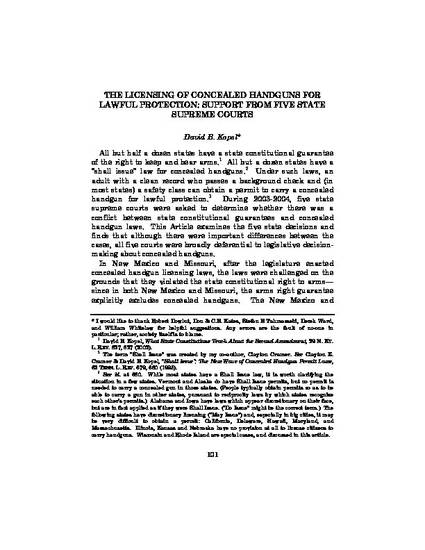
Article
The Licensing of Concealed Handguns for Lawful Protection: Support from Five State Supreme Courts
Albany Law Review
(2005)
Abstract
All but half a dozen states have a state constitutional guarantee of the right to keep and bear arms. All but a dozen states have a shall issue law for concealed handguns. Under such laws, an adult with a clean record who passes a background check and (in most states) a safety class can obtain a permit to carry a concealed handgun for lawful protection. During 2003-2004, five state supreme courts were asked to determine whether there was a conflict between state constitutional guarantees and concealed handgun laws. This Article examines the five state decisions and finds that although there were important differences between the cases, all five courts were broadly deferential to legislative decision-making about concealed handguns.
In New Mexico and Missouri, after the legislature enacted concealed handgun licensing laws, the laws were challenged on the grounds that they violated the state constitutional right to armssince in both New Mexico and Missouri, the arms right guarantee explicitly excludes concealed handguns. The New Mexico and Missouri Supreme Courts rejected the constitutional challenge; both courts ruled that the constitutional clause about concealed carry means that the legislature has broad discretion, not that the legislature is forbidden to enact a licensing system.
The constitutions of Ohio and Wisconsin also guarantee the right to keep and bear arms, and have no text excluding concealed handgun carrying from the scope of the right. However, both states had laws which almost completely prohibited the carrying of concealed handguns. When the Ohio prohibition was challenged, the Ohio Supreme Court ruled that the prohibition of concealed handgun carrying was constitutional because state law still allowed the carrying of unconcealed handguns. As a result, large numbers of Ohioans began carrying unconcealed handguns and, in response, the Ohio legislature quickly enacted a shall issue law to legalize concealed handguns.
In Wisconsin, the Supreme Court ruled that the concealed handgun prohibition was unconstitutional insofar as it applied to a persons home or place of business, but was constitutional as applied to all other locations.
Rhode Islands court faced the most complicated issue because Rhode Island has two concealed handgun licensing laws: a discretionary law for licensing by the attorney general and a mandatory law for licensing by towns and cities. The court found both laws to be consistent with Rhode Islands constitutional right to bear arms.
Keywords
- right to arms,
- right to carry,
- bear arms,
- state supreme courts,
- concealed carry
Disciplines
Publication Date
2005
Citation Information
David B Kopel. "The Licensing of Concealed Handguns for Lawful Protection: Support from Five State Supreme Courts" Albany Law Review Vol. 68 Iss. 2 (2005) p. 305 - 336 Available at: http://works.bepress.com/david_kopel/75/
